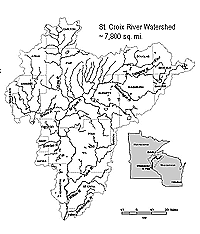UNIVERSITY OF WISCONSIN River Falls

St. Croix Institute
Overview
Sustainable Community Development:
Leadership or the Risk of Irrelevance
The SCISCD / Institute is a "Think and Do Tank" that "Walks the Talk," promoting community solutions based on globally informed leadership in personal, professional and civic life. (Organizational Chart)
Goal 2 of the 2007-12 UWRF Strategic Plan – “Model Sustainability Principles” – stated “UWRF will model and champion the principles of sustainable community development.” (Scorecard) This choice of words is a very critical point. They indicate we are consciously pursuing a holistic, community-based focus; not a nebulous, shotgun approach to sustainability.
The words also indicate our recognition that all solutions are ultimately local and that communities are where the rubber meets the road. Regardless of the global issues, it is not until solutions are identified and applied at the local level that we will ever solve any of them individually, much less all of them together.
More specifically, based on the monitoring and analysis across numerous world-wide, exponential trends in climate change, peaking of fossil fuels, food shortages, declining water quantity and quality, species extinction, socio-economic disparity, affordable housing shortages, inflationary monetary systems, and a myriad of other contexts (see Drivers and Model Frameworks), the vulnerability is not hard to recognize as the dots get connected and the big picture emerges.
These “Drivers” of sustainability are what we see play out daily in the news, and in the dynamics of our personal, professional, and civic lives, to one degree or another.
In response, UWRF has created the St. Croix Institute for Sustainable Community Development (SCISCD). The Institute is founded on the principle that “sustainability” is a concept that we no longer have the luxury of “choosing” to pursue. Based on the collective data and trend analysis across ecologic, social, and economic contexts, it is now consciously more of an “attempt to avoid unsustainability.”
SCISCD exists for the sole purpose of service in achieving Goal 2 in all contexts of the campus community, including the breadth of its community outreach to the city of River Falls, the St. Croix region, State of Wisconsin, and beyond. The SCISCD is an institutional manifestation of our realization that if UWRF is not part of the solution, then we are part of the problem.
If we truly believe the scientific data and the analysis of its implications, then we have no choice but to take a leadership position, or else run the real risk of irrelevance as a publicly supported institution.
SCISCD is consistent with grassroots trends already in motion across the state. Wisconsin is ground zero for a national social movement for sustainable community development. It now boasts the largest number of sustainable community resolutions passed by municipal, village, town, and county boards. Virtually all of these resolutions are based on the “Eco-Municipality” concept of The Natural Step (TNS) model that emerged in Sweden in the 1980s. The TNS model came to the United States in the ’90s and has increasingly gained a very strong following as a premier framework for both business and community models (click on logo at right for more information).
Here in the St. Croix River watershed, an area of almost 7,800 square miles straddling the Wisconsin and Minnesota border, there are numerous communities pursuing a wide variety of sustainability-based initiatives, from energy independence, carbon neutrality and local food systems to affordable housing, K-12 curricula redesign and eco-industrial parks.
Almost invariably, these projects recognize that sustainable community development is all about “Re-localization.” Re-localization is not a denial or turning away from globalization. However, it is a recognition that communities are sustainable only to the degree to which they are self-sufficient in energy, food, water, shelter, clothing, and commerce based on the integrity, carrying capacity, and resiliency of the native habitats and bio-region in which they exist. It is only from that local basis that long-term commercialization and exporting of basic natural resources can be assured to meet the needs of future generations, sustainably, fairly and equitably.
It is assumed that no single community in the St. Croix region (including the UWRF campus as a community) can reasonably expect to be totally independent of the other communities that share its resource base, nor maximize its own economy of scale and commercial interests without a regional approach to shared goals and cooperation. The Institute is therefore committed to supporting and facilitating a comprehensive model, based on integrated planning, that assists the campus in becoming a microcosm model that is not only replicable across the state and nation, but that best prepares UWRF students for a dynamic, sustainability-based future in any career path they might choose.













